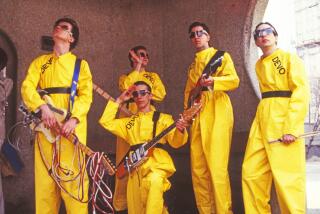Overrated/Underrated: A case for Alabama Shakes’ textured mix of rock and R&B
There’s a lot of pop culture to sort through week after week. Times staff writer Chris Barton offers his take on what’s up and what’s down in music, movies, television and just about anything else out there that’s worth considering.
UNDERRATED
‘Experimenter’ (2015)
If you need an actor to portray someone smart and thoughtful while being a little unsettling, Peter Sarsgaard is your man, and this film directed by Michael Almereyda uses him to the fullest. What could have been a dry, research-driven story is livened with kitchen-sink visual flourishes and left-field cameos (author Gary Shteyngart and comic Jim Gaffigan, to name two) that shine another light on social psychologist Stanley Milgram’s study of the darker aspects of human behavior.
Alabama Shakes’ ‘Sound & Color’

Alabama Shakes singer Brittany Howard performs at the 2015 Grammys.
Somewhere between Taylor Swift appearing live from the “Maleficent” set and a performance by Kendrick Lamar that made the rest of the Grammys feel stale and lifeless, this band felt like it had an outside chance to win album of the year in addition to its other awards. It would’ve been an upset — until you listen to the album’s high-powered yet textured mix of rock and R&B fronted by the supernova voice of Brittany Howard and realize that this should have been no surprise at all.
OVERRATED
Political-palooza 2016

Coffee mugs for sale with the images of Democratic presidential candidate Hillary Clinton and Republican presidential candidate Donald Trump sit side by side on a shelf of a souvenir s
Submitted in response to the endless heated debates, the repetition of talking points and storylines, the bilious talking heads and networks that hasten the evolution of our political process into a surrealist mix of low-rent reality TV and sports talk radio: Are we there yet? If we’re going to keep treating politics as if it were entertainment, let’s at least give Hollywood some credit: No development executive would ever test an audience’s patience with a show that lasts this long and costs this much money. Is it too late for a rewrite?
‘Vinyl’ nostalgia
Even if you set aside the self-important bombast, the bizarre Led Zeppelin cosplay and the strange choice to build a show around a coked-out record executive (talk about sympathy for the devil), the biggest problem is its tired insistence on glorifying an already over-idealized past. As if it wasn’t hard enough spending decades hearing the ‘60s held as a magical, you-just-had-to-be-there time, now the ‘70s are this long-gone paradise of “real” music and “real” New York. How misguided we must be for finding pleasure in music from today.
More to Read
The biggest entertainment stories
Get our big stories about Hollywood, film, television, music, arts, culture and more right in your inbox as soon as they publish.
You may occasionally receive promotional content from the Los Angeles Times.











